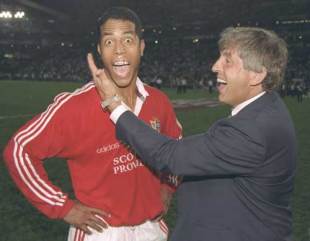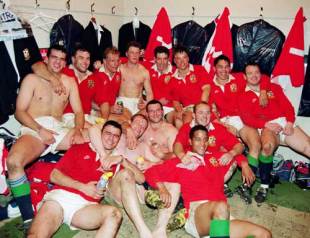|
Scrum Sevens
An Englishman, a Scotsman...
ESPN Staff
February 14, 2013

Sir Ian McGeechan celebrates with Jerry Guscott following the series triumph in South Africa in 1997
© Getty Images
Enlarge
Lions head coach Warren Gatland caused controversy this week by hinting that a large English contingent in this summer's tour to Australia could bring unwanted media scrutiny from press at home and Down Under. So this week Scrum Sevens looks at the compositions of the previous seven Lions tours, dating right back to 1983, revealing a strong - if expected - link between the Six Nations champions and the Lions touring squad. 2009 The call went out for Lions legend Sir Ian McGeechan to restore their pride against the world champions South Africa after a traumatic tour of New Zealand in 2005. McGeechan closed ranks, scaled back personnel and tried to create a close-knit touring culture reminiscent of Lions tours of the past. Whether by accident or design, there was a more even spread of accents in the squad. Wales head coach Warren Gatland, Welshmen Rob Howley and Neil Jenkins and Englishmen Graham Rowntree and Shaun Edwards were all part of coaching team charged with toppling the Springboks. After securing their first Grand Slam since 1948, Six Nations champions Ireland provided the biggest contingent of tourists with 13 while Alan Quinlan, Tomas O'Leary and Jerry Flannery were originally selected but never made it on to the plane. Wales were also well represented with 13 players making it out to South Africa and Tom Shanklin withdrawing from the squad before departure. England, who had finished second in the Six Nations on points difference, supplied just eight tourists - a figure that rose to 10 with Tom Croft and Tim Payne being called up as replacements. Despite the fact there was a Scot at the helm, they had just four players in the squad with two of them, Mike Blair and Ross Ford, late call ups. McGeechan's Lions won many plaudits for their attacking rugby and tremendous spirit but a Test series victory eluded them for a third series running. 2005 World Cup winning coach Sir Clive Woodward was given free rein to create the most sophisticated and professional Lions outfit ever seen. He called on Andy Robinson, Gareth Jenkins, Eddie O'Sullivan and McGeechan as his assistants, assembled a squad of 44 players - which would rise to 50 with injury replacements - and famously went as far as recruiting former government spin doctor Alastair Campbell as head of communications. While Woodward sought to break new ground in some areas, he kept faith with many of England's old guard who had won him the World Cup two years earlier in Australia. Woodward selected 20 Englishmen, which would rise to 23 during the tour, including Lawrence Dallaglio - who was retired from international rugby at the time - and Jonny Wilkinson who was struggling for form and fitness. Wales, who had swept the Six Nations a few months earlier, were expected to form the nucleus of the squad but they provided just 12 tourists and there was little seen of the flowing, infectious rugby that had won them Grand Slam. Again four Scots made the journey to New Zealand while 11 Irishmen were involved, including captain Brian O'Driscoll who was ruthlessly dumped out of the tour by Keven Mealamu and Tana Umaga. Welshman Gareth Thomas took over the captaincy as the elite tourists struggled to save face from a tour that led many to question the future of the Lions. 2001 The Lions' last tour of Australia saw New Zealander Graham Henry, who was also the Wales coach at the time, call up 20 Englishmen in total. England were approaching the peak of their powers under Woodward and had won all four of their Six Nations matches months earlier with their Grand Slam decider against Ireland postponed until October. Martin Johnson was entrusted to lead the Lions for a second time while O'Driscoll and Jason Robinson added flair to some solid foundations. Henry selected 11 Welshman, including Rob Howley who teamed up with Wilkinson in the half-backs. Ireland's Rob Henderson and Wales' Dafydd James were somewhat surprise inclusions in the Lions starting side but impressed in Australia. Eight Irishmen, including the influential Keith Wood, travelled Down Under while Scotland accounted for five of the tourists. After going 1-0 up with victory in the opening Test in Brisbane, the tour swiftly went sour. English scrum-halves Austin Healey and Matt Dawson caused their Kiwi coach some headaches by writing controversial newspaper columns which were said to incite the Wallabies, who went on to win the final two Tests to claim the series 2-1. 1997 The Lions toured South Africa for the first time since the end of apartheid in an historic tour on and off the pitch. McGeechan chose Johnson, who at the time was not the captain of England, as his skipper to stare eye-to-eye with the world champions' Gary Teichmann. Again England, who had finished second to France in the Five Nations, dominated the touring party with established stars such as Jerry Guscott alongside more left-field picks like John Bentley. In a smaller squad to those that would follow, there were five Scots, five Welshman and four Irishmen hunting the Springboks. But they had a big influence on the Test team with Gregor Townsend installed at fly-half, Wales' Neil Jenkins providing his metronomic goalkicking from fullback, Scott Gibbs providing thrust in midfield and props Tom Smith and Paul Wallace anchoring the scrum. After winning the first Test in Cape Town, which included a terrific try from Dawson, the Lions clinched the series victory with Guscott slotting a game-winning drop goal in the dying minutes in Durban.

The '93 Lions celebrate their second-Test victory over the All Blacks
© Getty Images
Enlarge
The Auld Enemy put old rivalries aside to lead the Lions to New Zealand in the last tour of the amateur era. The team was managed by Englishman Geoff Cooke, coached by countryman Dick Best and Scot McGeechan and captained by fellow Scot Gavin Hastings. The two countries made up the majority of the touring squad as well with England supplying 17 players and Scotland, who had finished second to France in the Five Nations, providing a quarter (eight) of the party. Five Welshman, including key players Ieuan Evans, Robert Jones and Scott Gibbs, went on tour while Mick Galway and Nick Popplewell added an Irish flavour to the squad. After losing the opening Test in Christchurch, 20-18, the Lions won the second test 20-7 to set up the decider in Auckland. But the tour ended in disappointment as the All Blacks triumphed 30-13 at Eden Park. 1989 Again there was a strong Scottish influence as McGeechan, Scotland coach at the time, took charge of the squad for the first time while countryman Finlay Calder captained the side. Gary Armstrong, David Sole, Craig Chalmers and the Hastings brothers were among the nine Scots in a 33-man squad for a 12-match tour. Englishman Roger Uttley acted as McGeechan's number two and England provided 12 tourists, including backs Guscott, Will Carling and Rory Underwood, while there was a hard English spine of Brian Moore, Paul Ackford, Mike Teague and Dean Richards in the Test side. Behind the pack was the classy Robert Jones at scrum-half and elusive winger Evans, two of eight Welshman in the squad. Giant lock Donal Lenihan led an Irish contingent of four, at the start of what would prove to be a lean period for Irish representation with the Lions. It was the Lions' first tour of Australia since 1971 and proved to be an historic one on the pitch as Calder's men rallied after losing the first Test to win the Test series 2-1. 1983 The 1983 tour to New Zealand saw the most even representation of countries of the last seven with 10 Englishmen, eight Scots, nine Irishmen and nine Welshman. Lions legend and proud Irishman Willie John McBride managed the tour while Scot Jim Telfer coached the squad and Ireland's Triple Crown winner Ciaran Fitzgerald was skipper. The tour was a long and ultimately unsuccessful one, lasting two months and 18 matches and ending in a 4-0 whitewash in the Test series against the All Blacks. The Lions, who had Scotland's Roy Laidlaw and Ireland's Ollie Campbell at half-backs, were afflicted by a long injury list and selection controversy as they struggled for any cohesion against a fearsome All Blacks side. The opening Test was a tightly fought contest, which the All Blacks won 16-12, but the subsequent matches proved more one sided as the hosts triumphed 9-0, 15-8 and 38-6. © ESPN Sports Media Ltd.
|
Live Sports
Communication error please reload the page.
-
Football
-
Cricket
-
Rugby
-
- Days
- Hrs
- Mins
- Secs
F1 - Abu Dhabi GP
Abu Dhabi Grand Prix December 11-131. Max Verstappen ()
2. Valtteri Bottas (Mercedes)
3. Lewis Hamilton (Mercedes)
4. Alexander Albon ()
5. Lando Norris ()
6. Carlos Sainz Jr ()
-
ESPNOtherLive >>
Golf - Houston Open
Snooker - China Open
Tennis - Miami Open

